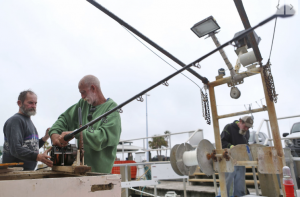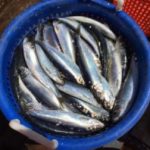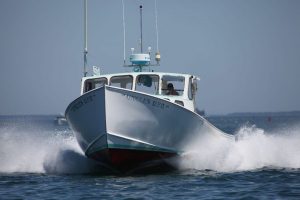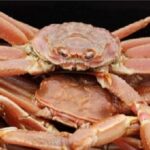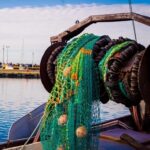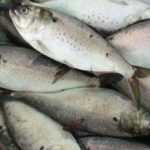Daily Archives: May 7, 2015
Court orders new safeguards to prevent fish farm disease spreading to ocean
 The federal government has been ordered to shore up its regulations to ensure diseases aren’t transferred from fish farms to the ocean. A Federal Court judge in Vancouver has struck down rules around transfer of fish between acquaculture farms and has given the Department of Fisheries four months to fix the regulations. The decision comes after a biologist accused a fish farm operator of moving diseased salmon smolts from its hatchery to a open pen fish farm on the British Columbia coast. Read the rest here 19:21
The federal government has been ordered to shore up its regulations to ensure diseases aren’t transferred from fish farms to the ocean. A Federal Court judge in Vancouver has struck down rules around transfer of fish between acquaculture farms and has given the Department of Fisheries four months to fix the regulations. The decision comes after a biologist accused a fish farm operator of moving diseased salmon smolts from its hatchery to a open pen fish farm on the British Columbia coast. Read the rest here 19:21
Marine Safety Information Bulletin – Notification of New Requirements for Commercial Fishing Vessels
 The purpose of this Bulletin is to remind the commercial fishing industry about safety and equipment requirements established by the Coast Guard Authorization Act of 2010 and the Coast Guard and Maritime Transportation Act of 2012 as well as other applicable laws. These new requirements are scheduled to go into effect by the date(s) set forth under the law. Read the rest here 18:34
The purpose of this Bulletin is to remind the commercial fishing industry about safety and equipment requirements established by the Coast Guard Authorization Act of 2010 and the Coast Guard and Maritime Transportation Act of 2012 as well as other applicable laws. These new requirements are scheduled to go into effect by the date(s) set forth under the law. Read the rest here 18:34
Coast Guard insists marine safety will ‘improve’ under new MCTS system
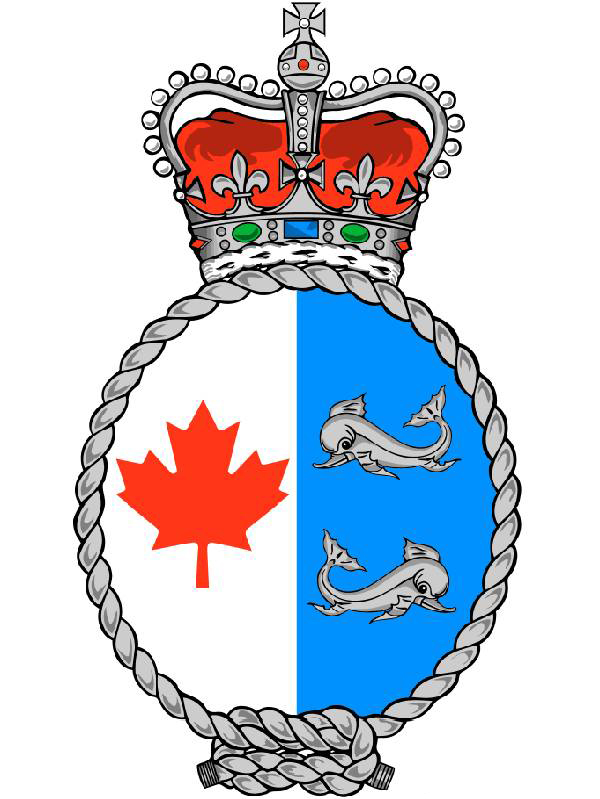 The Canadian Coast Guard says worries raised about marine safety as a result of the modernization and consolidation of its Marine Communications and Traffic Services (MCTS) centres is unfounded. That plan has many folks worried that frontline services like responding to distress calls and search and rescue communications could be impacted. Greg Lick, director general of operations for Coast Guard, said MCTS services will be impacted, but in a positive way. “[Services] won’t be affected. If anything, they’ll be improved,” YES! Of course! Read the rest here 18:02
The Canadian Coast Guard says worries raised about marine safety as a result of the modernization and consolidation of its Marine Communications and Traffic Services (MCTS) centres is unfounded. That plan has many folks worried that frontline services like responding to distress calls and search and rescue communications could be impacted. Greg Lick, director general of operations for Coast Guard, said MCTS services will be impacted, but in a positive way. “[Services] won’t be affected. If anything, they’ll be improved,” YES! Of course! Read the rest here 18:02
Our View: Congress can help NOAA support groundfishermen
 The science, expert experience and anecdotes shared Wednesday at a forum on groundfishing in the Northeast were quite convincing that the fisheries could be better managed. The problem comes into focus when we see how difficult it has been for NOAA surveys to deliver reliable data. UMass Dartmouth’s School of Marine Science and Technology has been able — on $450,000 of government funding — to run innovative surveys with video cameras on trawls that show a nonstop stream of fish in the bottom 6 to 8 feet of the water column. SMAST’s data suggest populations of yellowtail flounder and Gulf of Maine cod multiple factors higher than NOAA’s. Read the rest here 16:51
The science, expert experience and anecdotes shared Wednesday at a forum on groundfishing in the Northeast were quite convincing that the fisheries could be better managed. The problem comes into focus when we see how difficult it has been for NOAA surveys to deliver reliable data. UMass Dartmouth’s School of Marine Science and Technology has been able — on $450,000 of government funding — to run innovative surveys with video cameras on trawls that show a nonstop stream of fish in the bottom 6 to 8 feet of the water column. SMAST’s data suggest populations of yellowtail flounder and Gulf of Maine cod multiple factors higher than NOAA’s. Read the rest here 16:51
Reunited after 20 years: tagged tuna tells tales
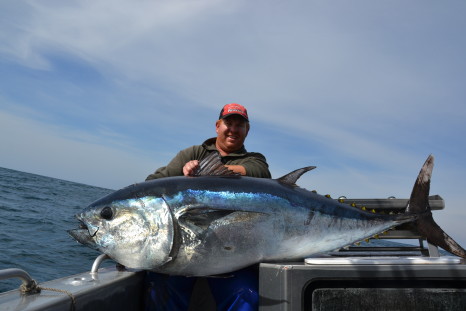 We have been reunited with an old friend. We met a long time ago, 22 years in fact, and we certainly left our mark during that first meeting. Now with a long passage of time behind us, we are keen to find where she has been all this time. We are, of course, talking about this stunning southern bluefin tuna (SBT). Tagged in 1993, the fish was reeled in by avid fisherman Matt Bell with the help of Skipper Dennis Heinicke, near Port MacDonnell last month. We first met ‘Bluey’ when she was approximately two years old. Read the rest here 16:22
We have been reunited with an old friend. We met a long time ago, 22 years in fact, and we certainly left our mark during that first meeting. Now with a long passage of time behind us, we are keen to find where she has been all this time. We are, of course, talking about this stunning southern bluefin tuna (SBT). Tagged in 1993, the fish was reeled in by avid fisherman Matt Bell with the help of Skipper Dennis Heinicke, near Port MacDonnell last month. We first met ‘Bluey’ when she was approximately two years old. Read the rest here 16:22
LePage veto kills bill to find ways to stamp out invasive green crabs – Let’s react to the data!
 Essentially, the bill would have restored the closure of certain mudflats to clam and worm harvesting to make way for more data collection. LePage said he didn’t support the bill that originally created the pilot project and vetoed this year’s proposed extension because he believes its continuation is unnecessary. “The pilot project has been conducted and the data has been gathered,” wrote LePage. “Let’s react to the data, not simply continue to extend this pilot ad infinitum.” Read the rest here 15:46
Essentially, the bill would have restored the closure of certain mudflats to clam and worm harvesting to make way for more data collection. LePage said he didn’t support the bill that originally created the pilot project and vetoed this year’s proposed extension because he believes its continuation is unnecessary. “The pilot project has been conducted and the data has been gathered,” wrote LePage. “Let’s react to the data, not simply continue to extend this pilot ad infinitum.” Read the rest here 15:46
Tuna fleets agree to 35pc reduction in fishing as part of ‘global initiative’ to boost prices
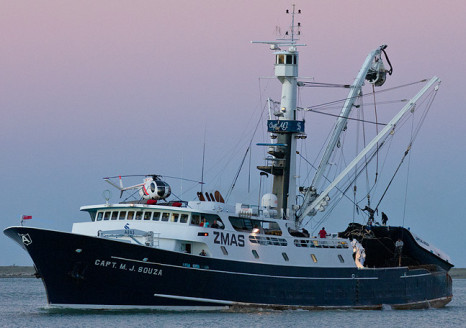
Some of the world’s biggest tuna fishing fleets have agreed to reduce their catch by 35 per cent in an effort to ease the current market crisis. An oversupply of skipjack tuna has led to prices crashing from more than $US2,000 ($2,513) per tonne in 2013 to around $US1,000 ($1,256) a tonne, causing many purse seine boats to operate at a loss. The World Tuna Purse Seine Organisation (WTPO) has announced its members, including some fleets from non-members, will be cooperating with the reduced effort. Read the rest here 14:49
Call of the wild: Coho salmon get ready to leave net pens for the ocean
 About 442,000 coho salmon will be released from net pens near Tongue Point into the Columbia River Wednesday as part of the Clatsop County Fisheries Project select-area fishery program. The salmon, which came from the Oxbow Fish Hatchery in Cascade Locks, spent the last couple of weeks in the net pens while they smolt — a physical process which readies them to go to the ocean —and imprint the scent of the area so they can return for sport and commercial fishing. Read the rest here 14:40
About 442,000 coho salmon will be released from net pens near Tongue Point into the Columbia River Wednesday as part of the Clatsop County Fisheries Project select-area fishery program. The salmon, which came from the Oxbow Fish Hatchery in Cascade Locks, spent the last couple of weeks in the net pens while they smolt — a physical process which readies them to go to the ocean —and imprint the scent of the area so they can return for sport and commercial fishing. Read the rest here 14:40
GUEST COMMENTARY: Bering Sea halibut bycatch cuts critical for conservation
I’ll also be considering what’s coming up after I return to homeport — the June convening of the North Pacific Fishery Management Council in Sitka. There the Council will take final action on the proposed reduction of halibut bycatch caps in the Bering Sea/Aleutian Islands, or BSAI, region.This decision point comes after a decade of steady stock decline, during which time the directed halibut fishery quota in the BSAI has dropped by 63 percent. Halibut fishermen in the hardest hit region — the Central Bering Sea — are facing closure Read the rest here 13:12
Itchin’ for a Fight – Elver dispute between Maine DNR, Passamaquoddy flares up again
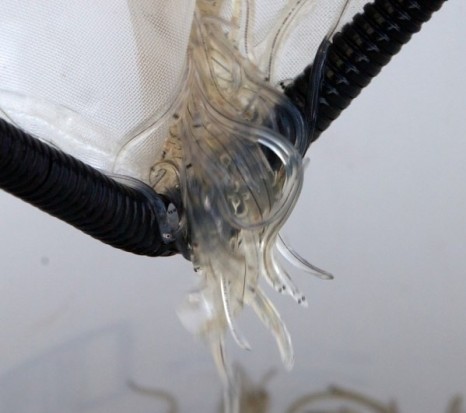 Tensions between state and local Passamaquoddy officials over elver fishing increased late Wednesday when the Department of Marine Resources announced it was taking emergency action to restrict what kind of gear tribal sustenance fishermen can use. “That’s all this is about — trying to keep Indians from catching eels,” Moore said. “It is taking tribal state relations backwards. It’s clearly racially motivated.” “I hardly look at this as a racial issue,” Keliher said. Read the rest here 08:44
Tensions between state and local Passamaquoddy officials over elver fishing increased late Wednesday when the Department of Marine Resources announced it was taking emergency action to restrict what kind of gear tribal sustenance fishermen can use. “That’s all this is about — trying to keep Indians from catching eels,” Moore said. “It is taking tribal state relations backwards. It’s clearly racially motivated.” “I hardly look at this as a racial issue,” Keliher said. Read the rest here 08:44
Best Available Science? – Video, Watermen React to Increase in Menhaden Quota Increase
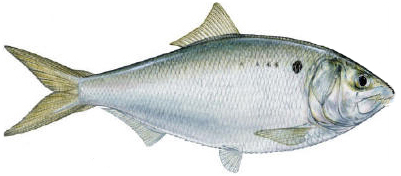 “This is a regulation that’s been overturned and it’s great for us, I mean it’s only 10 percent but you have to start somewhere. It’s a great thing for us,” said Newberry. But some watermen are still angered that they weren’t restored to their old catch limits. They’ve had a twenty percent cut in quotas since those earlier assessments. “I’ve got four men working for me. There’s five families feeding off my boat. I’ve got a 20 percent reduction for year, and now they’re like well here’s ten percent back. They didn’t need a reduction,” said Boo Powley, Read the rest here 08:23
“This is a regulation that’s been overturned and it’s great for us, I mean it’s only 10 percent but you have to start somewhere. It’s a great thing for us,” said Newberry. But some watermen are still angered that they weren’t restored to their old catch limits. They’ve had a twenty percent cut in quotas since those earlier assessments. “I’ve got four men working for me. There’s five families feeding off my boat. I’ve got a 20 percent reduction for year, and now they’re like well here’s ten percent back. They didn’t need a reduction,” said Boo Powley, Read the rest here 08:23






 Here’s an idea:
Here’s an idea: 


























